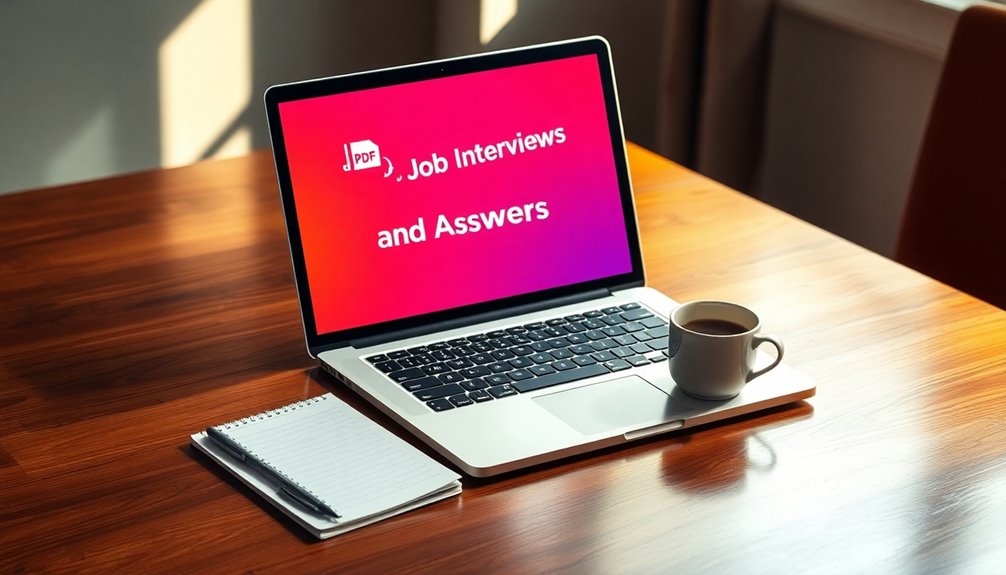Canceling a job interview can be tricky, but you can do it smoothly. First, notify the interviewer as soon as you know you need to cancel, ideally with at least a day's notice. Provide a valid reason, such as a personal emergency or accepting another job. Include key details like the job title and scheduled date. Stay professional and polite in your communication, expressing gratitude for the opportunity. If possible, offer to reschedule, showing your continued interest. Finally, maintain a cordial tone to keep future opportunities open. Want to guarantee you navigate this process seamlessly? There's more to explore!
Key Takeaways
- Notify the interviewer as soon as possible, ideally at least one day in advance, to show respect for their time.
- Provide a valid reason for the cancellation, such as illness or a family emergency, to maintain professionalism.
- Include essential details in your communication, such as the job title, company name, and scheduled interview date and time.
- Express gratitude for the opportunity and acknowledge the time invested by the interviewer to keep the relationship positive.
- Suggest specific alternative dates and times for rescheduling to demonstrate your continued interest in the position.
Notify as Soon as Possible

When you realize you need to cancel a job interview, it's crucial to notify the interviewer as soon as possible. Providing advanced notice shows respect for their time and helps maintain a positive relationship. Ideally, you should aim to cancel at least a day in advance. If that's not feasible and you must cancel last-minute, make the call directly to guarantee your message is received immediately. Following up with an email is also important, as it formalizes your cancellation and provides a written record. Timely notification not only allows the interviewer to adjust their schedule but also increases your chances of successfully rescheduling. Respect for waiting list applicants can also enhance your professional reputation, showing that you value the opportunities available to others. Including your availability in the cancellation message can demonstrate your continued interest in the position.
Provide a Valid Reason

Providing a valid reason for canceling a job interview is essential for maintaining professionalism. When you communicate your decision, aim for a brief explanation that reflects your situation honestly. Acceptable reasons include serious, unexpected problems like a sudden illness or urgent family issue. If you've accepted another job offer that fits your career goals, it's perfectly reasonable to cancel. You might also realize that the company or role doesn't align with your values or long-term aspirations, which is valid. However, avoid impulsive changes of heart or canceling for a potentially better interview without a firm offer. Superficial reasons, like minor travel inconveniences, can come off as unprofessional, as can canceling due to lack of preparation. Always express gratitude for the interview opportunity and maintain a polite, respectful tone throughout your communication. By being transparent and honest about your reason, you not only demonstrate professionalism but also leave the door open for future opportunities. Remember to inform the employer as soon as you make your decision, allowing them to adjust their plans accordingly. Timely communication helps minimize the impact of your cancellation on the employer's schedule.
Include Relevant Details

Including relevant details in your cancellation notice is essential for clear communication. When you cancel an interview, be certain to include the job title and company name along with the scheduled date and time. This clarity helps avoid any confusion. Here's a simple table to guide you on what to include:
| Detail | Example | Importance |
|---|---|---|
| Position and Company | Marketing Specialist at XYZ Corp | Avoids confusion |
| Date and Time | March 15, 2023, at 10:00 AM EST | Confirms the scheduled time |
| Contact and Coordinator Info | John Doe, jdoe@xyzcorp.com | Guarantees proper communication |
| Rescheduling Context | Request to reschedule to March 22 | Shows willingness to continue |
| Appreciation | Thank you for the opportunity | Maintains goodwill |
It's also important to provide a brief explanation for your cancellation, as reasons to cancel an interview can help the recipient understand your situation better.
Be Professional and Polite

When you cancel a job interview, always use appropriate greetings and maintain a respectful tone. Apologize for any inconvenience your cancellation may cause, and express gratitude for the opportunity to interview. This professionalism not only reflects well on you but also keeps the door open for future possibilities. Remember that notifying the right person is essential to ensure the message reaches the appropriate individual.
Use Appropriate Greetings
A thoughtful greeting sets the stage for your cancellation message, so it's essential to address the right person directly. Here are some tips to guarantee your greeting is professional and polite:
- Address the person who scheduled the interview, usually the recruiter or hiring manager.
- Use the formal title (Mr./Ms./Mrs./Dr.) if known, followed by their last name.
- If you don't know the name, opt for a generic greeting like "Dear Hiring Manager" or "Dear Recruitment Team."
- Start with a polite opening, such as "Dear [Interviewer’s Name]," to set a respectful tone. Maintaining a positive relationship with the employer is crucial for future opportunities.
Apologize for Inconvenience
After you've set the right tone with your greeting, it's important to express your regret about the cancellation. Apologize sincerely for any inconvenience your cancellation may cause. Acknowledge the time and effort the interviewer has invested in preparing for your meeting. This shows you understand the disruption your decision creates in their hiring process.
Be concise and clear when stating your reason for cancellation. You don't need to explore personal details; just be honest and straightforward. Keeping your message focused on the inconvenience rather than providing excessive explanations is crucial, especially since cancellations are often necessary due to unforeseen circumstances.
Maintain a respectful tone throughout your communication. Use polite language that reflects your appreciation for the interviewer's time and resources. Avoid any language that might come across as rude or dismissive, as this could damage your professional reputation.
If possible, offer to reschedule the interview. Express your continued interest in the opportunity and provide your availability for alternative dates. Thank the interviewer for considering your request to reschedule, reinforcing your commitment to the process and respect for their time. This approach will help you preserve the relationship and keep the door open for future opportunities.
Thank Interviewer for Opportunity
Expressing gratitude after canceling a job interview is essential to maintain professionalism. It not only reflects your respect for the interviewer but also helps in preserving valuable connections. Here are a few key points to contemplate:
- Thank the interviewer for the opportunity to discuss the role.
- Acknowledge the time and effort they put into the hiring process.
- Show appreciation for learning about the company and its culture. Additionally, expressing gratitude can enhance relationships and may lead to future opportunities even after a cancellation.
- Use polite phrases to make your message personal and sincere.
When crafting your message, be sure to maintain a formal tone. Clearly mention the details of the scheduled interview, including the date, time, and specific position. Avoid informal language, and keep your communication concise and to the point.
It's important to respect the interviewer's time, so express your gratitude for the hours they dedicated to reviewing your application. Make it clear that your decision to cancel isn't a reflection on the company or the role. Finally, if appropriate, suggest staying in touch for potential future opportunities. Ending on a positive note can leave a lasting impression and open doors down the line.
Offer to Reschedule if Applicable

Often, circumstances arise that make it necessary to reschedule a job interview. If you find yourself in this situation, it's essential to notify the hiring manager promptly, ideally at least a day in advance. Choose the best method of communication based on your previous interactions—whether that's email or a phone call. Respect the hiring manager's time by minimizing inconvenience and expressing appreciation for their understanding.
When explaining the reason for rescheduling, keep it brief and professional. A valid reason, such as illness or a family emergency, is acceptable, but avoid unnecessary details that might dilute your message. Acknowledge the inconvenience your request may cause. It's important to remember that rescheduling is generally acceptable with a legitimate reason; life events can necessitate changes in plans.
Next, suggest specific alternative dates and times for the interview. Be flexible, offering multiple options to find a mutually convenient time. This shows your enthusiasm for the opportunity and willingness to accommodate their schedule.
Maintain professionalism throughout your communication. Use a polite tone, thank the hiring manager for their time, and guarantee your message is clear and free of errors. Once a new time is agreed upon, follow up with a confirmation email to solidify the rescheduled interview.
Maintain Future Relationships

Even after canceling your interview, you should express your continued interest in the company and its future opportunities. Keeping the lines of communication open can help you stay connected and possibly reschedule down the line. Networking now can lead to valuable relationships that benefit you later in your career. Maintaining professionalism during this process is crucial, as it helps preserve your reputation within the industry.
Express Continued Interest
Maintaining a connection with the company after canceling an interview is essential for future opportunities. It's important to express your continued interest, ensuring you don't close any doors. Here's how you can do it effectively:
- Thank the interviewer for their time and consideration.
- Acknowledge the effort they put into arranging the interview.
- Show appreciation for the opportunity to engage with the company.
- Indicate your interest in potential future roles.
In your communication, be polite and respectful. Use a courteous tone, acknowledging the inconvenience your cancellation may have caused. Acknowledge the significance of the interview experience and the learning you gained, even if it didn't go as planned. Professionalism aids in building a good rapport for potential future interactions, making it crucial to convey your interest sincerely.
Make it clear that you're still interested in the company and its mission. You might say something like, "I hope to revisit this connection in the future" or "I'm enthusiastic about potential opportunities down the line." This approach leaves the door open for future interactions, showing you're keen to maintain a professional relationship. Remember, how you handle this situation can influence your career path down the road.
Keep Communication Open
Open lines of communication after canceling a job interview can pave the way for future opportunities. When you reach out to the employer, maintain a polite and professional tone. Start by thanking them for the opportunity and sincerely apologize for any inconvenience your cancellation might cause. Keep your message concise and clear, avoiding over-apologizing to guarantee your sincerity shines through.
Notify the employer promptly after deciding to cancel, using email or a phone call based on urgency. Provide essential details like the job title and the scheduled interview time, demonstrating your respect for their time and effort. If appropriate, offer a brief explanation for your cancellation, remaining honest yet succinct. Timely responses reflect respect for others' time and can help maintain a positive rapport.
If you're still interested in the position, propose rescheduling the interview. Be flexible with your availability and suggest multiple time slots to accommodate their schedule. Express gratitude for their understanding and flexibility. This proactive approach not only shows your continued interest but also keeps the door open for future interactions. By effectively managing your communication, you create opportunities for collaboration down the road, helping you maintain a positive relationship with the employer.
Network for Future Opportunities
Networking for future opportunities is essential for building and sustaining professional relationships that can benefit your career long-term. By actively engaging with your network, you can open doors to new possibilities and enhance your professional growth. Additionally, leveraging data-driven marketing strategies can help you effectively communicate your personal brand to your connections.
Here are some effective ways to network:
- Attend industry events to meet relevant professionals.
- Join professional organizations aligned with your career goals.
- Utilize online platforms like LinkedIn to connect with industry leaders.
- Engage with alumni networks from your educational background.
Building meaningful relationships is key. Actively listen during interactions, show genuine interest, and offer help when you can. Collaborating on projects can deepen these connections, while introducing contacts to one another expands your network. Additionally, active networking can lead to numerous career growth opportunities.
Maintaining ongoing engagement is vital, too. Follow up after events, celebrate your connections' successes, and keep communication lines open through emails or messages. This ongoing interaction strengthens relationships over time.
Finally, leverage your network for insights and opportunities. Seek advice, learn about job openings, and find mentors who can guide you. By nurturing these relationships, you position yourself for future success in your career.
Frequently Asked Questions
What if I Need to Cancel on the Day of the Interview?
If you need to cancel on the day of the interview, contact the hiring manager or recruiter immediately. A phone call is best for quick communication, but if that's not possible, send a clear email. Apologize for the inconvenience and express gratitude for the opportunity. If you're still interested, suggest rescheduling. Make sure to follow up to confirm they received your message and maintain a professional tone throughout.
Can I Cancel an Interview via Text Message?
Did you know that 70% of employers prefer candidates to cancel interviews through email or phone? While you can cancel an interview via text, it's not the best approach. Texts often lack professionalism and clarity, which can lead to misunderstandings. If you must cancel, consider using email or calling instead. This way, you guarantee your message is received and maintain a positive impression for future opportunities.
How Do I Handle Multiple Interview Cancellations?
When you're handling multiple interview cancellations, acknowledge the inconvenience you're causing and sincerely apologize. Keep your communication professional and polite, even if you've canceled several times. If possible, suggest new dates for rescheduling and express your continued interest in the job. Always thank the interviewer for their understanding and time. Maintaining transparency about your reasons can help preserve the relationship for future opportunities, so don't hesitate to communicate openly.
Is It Unprofessional to Cancel an Interview Last Minute?
It's not inherently unprofessional to cancel an interview last minute, but how you handle it matters. You should notify the interviewer as soon as possible, ideally with a phone call. Apologize for the inconvenience and express gratitude for the opportunity. Keep your message concise and respectful. If appropriate, offer to reschedule, and be mindful that future connections might still be valuable. This way, you maintain professionalism, even in unexpected situations.
Will Canceling an Interview Affect My Reputation?
Imagine a ship sailing smoothly across calm waters. Canceling an interview can create ripples, but it doesn't have to sink your reputation. If you notify the interviewer promptly and courteously, you can navigate the situation without causing waves. A respectful cancellation shows you value their time, leaving the door open for future voyages. Just remember, honesty and professionalism in your communication will help keep your ship afloat in the professional sea.
Conclusion
Now that you know the steps to cancel a job interview gracefully, imagine the impact of your thoughtful approach. By notifying early and maintaining professionalism, you're not just closing a door; you're leaving it ajar for future opportunities. What if that company comes back with an even better role down the line? Remember, it's all about the connections you build. So, take a deep breath and handle it well—you never know where your path might lead.









